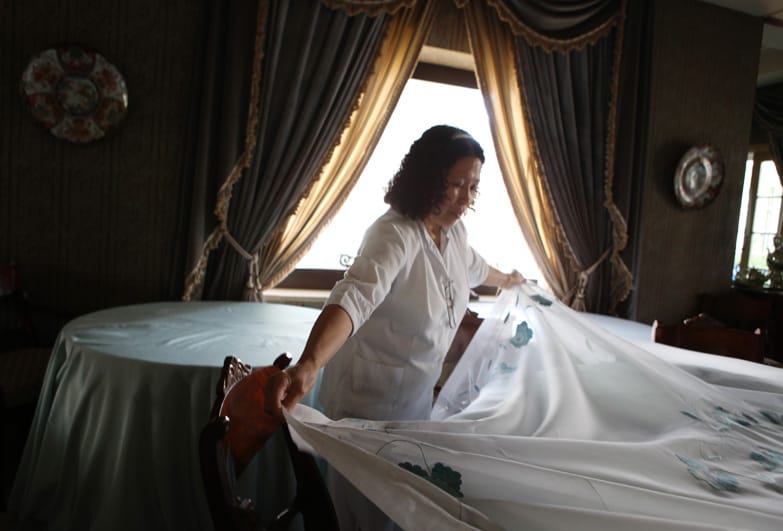The Price of Leaving

As Lebanon empties of foreigners, a quarter million domestic workers remain trapped.
In the shadows of Lebanon’s glamorous high-rises, women from countries like Kenya, Ethiopia, Sri Lanka and the Philippines clean homes and care for children, earning $300 a month– an amount that would barely cover groceries in Western countries. For these women, domestic work is more than simply a form of employment; it’s a lifeline and a necessity, representing the third-largest source of income for women in the Philippines.
As Lebanon began to emerge from the rubble of their civil war, domestic workers from Asia and Africa flooded into the country in search of opportunities. The International Labor Organization (ILO) defines these women as: individuals, often women, engaged in house-related work within an employment relationship. Today, their numbers have swelled to over a quarter million, providing a crucial framework for Lebanon’s economy.
In October 2024, Israeli forces struck Southern Lebanon, targeting the terrorist organization Hezbollah. The impact of the attack ricocheted through civilian communities and displaced hundreds of thousands. United Nations officials reported that all 900 government-facilitated shelters located throughout major cities had reached capacity, forcing those remaining to flee the country. For migrant workers, already the most vulnerable members of Lebanese society, the crisis proved to be especially catastrophic. They were stripped of shelter and other basic necessities in a country where they already struggled to stay afloat.
At the core of their vulnerability lies the kafala system: an Arabic word meaning “sponsorship.” This legal framework, prominent in most Muslim countries, strips domestic workers of fundamental rights like the ability to form unions, have universal labor laws or earn a minimum wage. The system makes exploitation exponentially more accessible for employers.
The cost of this system is devastatingly clear. Domestic workers in Lebanon are unable to change or quit their job without the permission of their employers and workers are in danger of losing their migration status once their employment relationships end. In a 2014 interview with the non-profit Anti-Slavery, a Nepalese woman named Suvitra Pulami Magar who worked in Lebanon explained the powerlessness domestic workers face.
“It will be difficult if you escape,” Magar said. “If they catch you then they don’t treat you very well. You will be taken to the police and they will beat you. They will take away your things including your passport.”
With the progression of the war towards the North, the precariousness of these worker’s situations is intensified. Myriam Prado, a Filipina citizen, and the co-founder of Alliance of Migrant Domestic Workers speaks on behalf of her community’s growing fears, concerned that a full-blown conflict with Israel would mean months or even years of being at risk.
“I’m a widow and I have two boys [back home],” Praod said. “I don’t know what will happen here, but there’s no work back home.”
This sentiment is echoed by the story of Imelda Castro, a 64-year-old woman born in the Philippines. Despite the active threat, Castro decided to stay in Lebanon because of her family’s financial situation. Like many domestic workers, Castro single-handedly supports her family of five from her income in Lebanon.
“Lebanon is my home,” Castro said, “I’m not rich, I come from a poor family.”
According to The New York Times, nations like Canada and Germany seamlessly chartered flights to evacuate their citizens, while most domestic workers remain trapped. Their escape is blocked by financial and political barriers. Work visas under the kafala system may present problems at the border and overstay fees, Dara Foi’elle of Migrant Workers Action notes, can be several hundred dollars— weeks of labor for these women. A quarter-million women find themselves stuck in an active war zone, while evacuation flights leave with hundreds of empty seats.
The situation is particularly dire for women from Ethiopia, Sudan and Sri Lanka, who cannot return to their native countries. In these countries, recent or ongoing conflicts have decimated cities. For them, the concept of “home” has ceased to exist– there is nowhere for them to return to.
With their employers’ homes deemed unsafe and abandoned by official channels of support, these women are sometimes forced to sleep on public beaches and in abandoned warehouses. Their dignity stripped away by outside circumstances.
This pattern of abandonment and neglect is not new, it mirrors that of Vietnamese domestic workers left after the fall of Saigon and Ethiopian housekeepers stranded during the Arab spring. Each crisis exposed the same faults in labor policies and aid priorities. In Lebanon, these women’s stories reflect a broader failure of international humanitarian responses: the urge to overlook those who exist in poverty and the margins of society.
The inequity of wartime evacuation has long favored the middle and upper classes, but Lebanon’s current crisis has magnified this disparity to unprecedented levels. Hundreds of thousands of lower-class migrant women are caught in an active war zone. They have a viable way to escape — but not the monetary means to do so.
Although the political suppression of domestic workers under the kafala system demands moral condemnation, the widespread international neglect of these women’s safety is perhaps more troubling. Without assistance from resource-rich countries like the United States, these essential workers remain stranded, victims of both the war and the world’s indifference.



